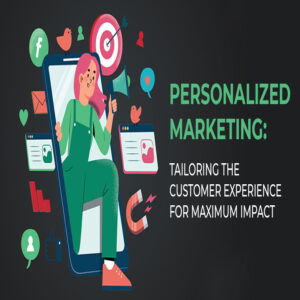
In today’s digital era, customers expect personalized experiences from the brands they engage with. Generic marketing strategies are no longer sufficient to captivate and retain customers. To stay competitive and build lasting relationships, businesses must embrace personalized marketing approaches. This blog explores the concept of personalized marketing and its significance in tailoring the customer experience for maximum impact.
Understanding Personalized Marketing:
Personalized marketing goes beyond addressing customers by their names; it involves leveraging data and insights to create tailored experiences that resonate with individual preferences, needs, and behaviors. By collecting and analyzing customer data, businesses gain valuable insights that allow them to deliver highly targeted and relevant content, offers, and recommendations. This approach creates a sense of individualized attention, enhancing customer engagement and loyalty.
Harnessing Customer Data:
The foundation of personalized marketing lies in harnessing customer data effectively. Businesses can collect data through various channels such as website interactions, purchase history, social media activity, and customer surveys. By analyzing this data, businesses can identify patterns, preferences, and behavioral trends that help create accurate customer profiles. These profiles enable businesses to segment their customer base and deliver personalized marketing messages to specific groups.
Segmentation and Targeting:
Segmentation plays a vital role in personalized marketing. By dividing customers into distinct groups based on shared characteristics or behaviors, businesses can tailor their marketing efforts more effectively. Segmentation can be based on demographics, geographic location, purchase history, or even browsing behavior. By understanding the unique needs and preferences of each segment, businesses can create targeted campaigns and offers that resonate with specific customer groups.
Customized Content and Messaging:
Personalized marketing allows businesses to deliver customized content and messaging that speaks directly to individual customers. By leveraging customer data and insights, businesses can create personalized emails, product recommendations, and website experiences. For example, an online retailer can recommend products based on a customer’s past purchases or browsing history. This level of customization makes customers feel understood and valued, increasing the likelihood of conversion and repeat purchases.
Omnichannel Personalization:
Customers interact with businesses through multiple channels, including websites, social media, mobile apps, and physical stores. Personalized marketing extends across these channels to ensure a seamless and consistent experience. By integrating customer data and preferences across channels, businesses can provide personalized recommendations and offers regardless of the platform. This omnichannel personalization creates a cohesive customer journey and enhances the overall brand experience.
Automation and AI:
Automation and Artificial Intelligence (AI) play a significant role in scaling personalized marketing efforts. AI-powered algorithms can analyze large volumes of customer data and make real-time recommendations, ensuring personalized experiences are delivered at scale. Chatbots and virtual assistants can provide personalized assistance to customers, addressing their specific queries and needs. Automation streamlines processes and enables businesses to deliver timely and relevant messages, fostering a deeper connection with customers.
The Power of Personalization in Customer Retention:
Personalized marketing not only helps attract new customers but also plays a crucial role in customer retention. By continuously engaging customers with personalized experiences, businesses can strengthen loyalty and foster long-term relationships. Customers are more likely to remain loyal to brands that understand and cater to their individual preferences, needs, and aspirations.
Personalized marketing is no longer a luxury; it has become a necessity for businesses seeking to thrive in a competitive landscape. By leveraging customer data, segmentation, customized content, and automation, businesses can create meaningful connections with customers and maximize the impact of their marketing efforts. Personalized marketing enhances customer satisfaction, fosters loyalty, and drives business growth. By embracing personalization, businesses can deliver exceptional customer experiences that resonate with individuals, setting themselves apart from the competition in a crowded marketplace. In today’s customer-centric world, personalized marketing is the key to success.
Keywords: #PersonalizedMarketing #CustomerExperience #MaximumImpact #DataAnalysis #Segmentation #Targeting #CustomizedContent #OmnichannelPersonalization #Automation #AI #CustomerRetention #Loyalty #DataDrivenMarketing #CustomerProfiling #PersonalizationAtScale #CustomerEngagement #BrandExperience #AIAlgorithms #Chatbots #VirtualAssistants #LongTermRelationships #EmailMarketing #CustomerCentricMarketing


